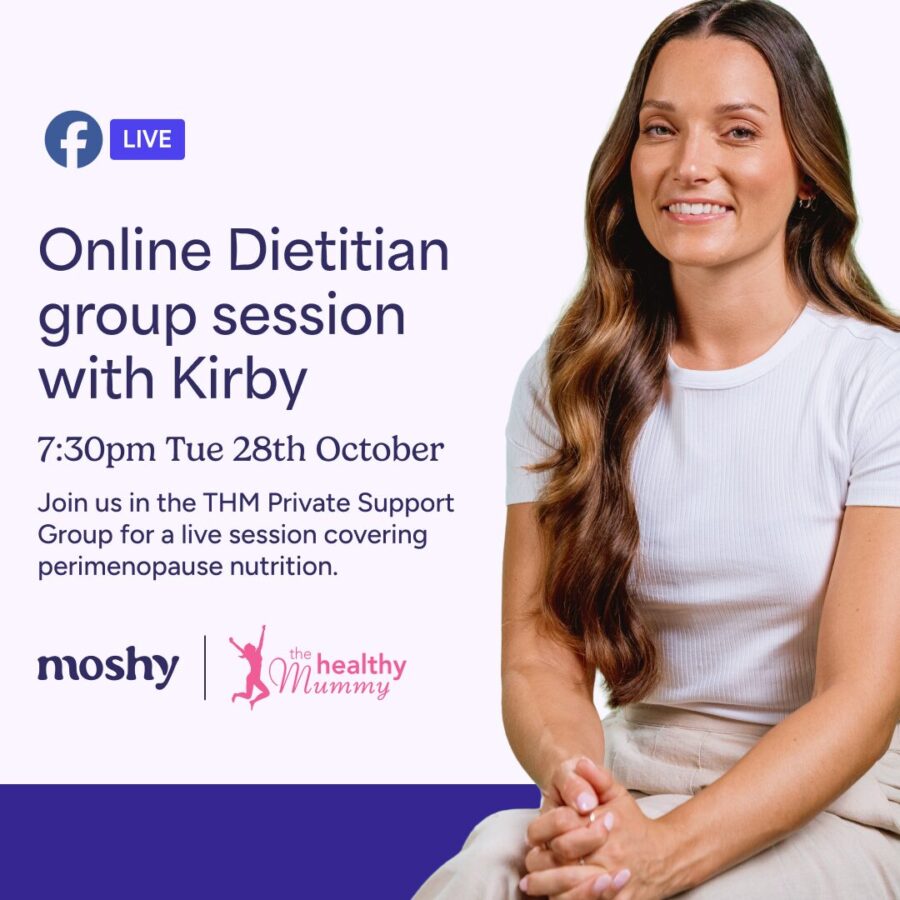Feeling Overwhelmed? A Simple Guide to Perimenopause & Menopause
Navigating perimenopause and menopause can feel overwhelming, with hormonal shifts impacting everything from your weight and mood to your energy levels. We believe your health journey should be about feeling strong, supported, and confident at every stage of life.
Navigating perimenopause and menopause can feel overwhelming, with hormonal shifts impacting everything from your weight and mood to your energy levels. At The Healthy Mummy and our sister company Moshy, we believe your health journey should be about feeling strong, supported, and confident at every stage of life. That’s why we’ve teamed up with Moshy’s team of health practitioners to bring you this guide on how to proactively support your body and mind through this chapter.

Perimenopause & Menopause: Insights from the Moshy Medical Team
What Is Perimenopause and Menopause?
According to Dr. Kieran Dang, Moshy’s Chief Medical Officer, menopause is a single point in time, marked by 12 consecutive months without a menstrual period, whereas Perimenopause is the transitional journey leading up to it.
Perimenopause can begin anywhere from your mid-30s to your mid-40s and can last for several years as your body’s hormone production, particularly estrogen, begins to fluctuate.
Symptoms can vary and include:
- Irregular periods
- Hot flashes and night sweats
- Mood swings, irritability, anxiety, and brain fog
- Sleep disturbances and fatigue
- Changes in libido and vaginal dryness
Understanding these changes is the first step toward accepting them and managing them if they become problematic in your everyday life. Every woman’s experience is unique. It’s important to remember, this is a natural stage of life, not a condition that needs to be “fixed.”
Movement Through Perimenopause and Beyond
The right kind of movement is a powerful tool for managing symptoms, boosting energy, and feeling strong in your body. We spoke with Gaby Wolf, Moshy’s Exercise Physiologist, who emphasises the importance of a well-rounded routine.

The Best Exercises to Support Your Body
A well-rounded routine should include a mix of aerobic exercise, strength training, balance, and stretching.
- Aerobic Exercise: Simple activities like walking, cycling, or jogging improve cardiovascular health and can boost your mood and energy.
- Strength Training: This is especially crucial during this time. As estrogen levels decrease, bone mineral density and muscle mass can diminish. Strength training combats this by maintaining muscle mass and promoting bone health. You can use your own body weight, dumbbells, or resistance bands.
- Flexibility and Balance: Activities like yoga, Pilates, and tai chi are great for improving balance, coordination, and range of motion. This helps counteract joint stiffness and reduces the risk of falls, a significant concern as bone density decreases.
The Power of Strength Training
Strength training is a game-changer for women in perimenopause and menopause. It helps:
- Boost Bone Health: When muscles pull on bones during resistance exercises, it signals your bones to renew and strengthen themselves, which is key to preventing osteoporosis.
- Maintain Muscle Mass: As muscle mass naturally diminishes, your metabolism can slow down. Strength training helps maintain muscle and can aid in weight management.
- Improve Mental Well-being: It’s linked to better mood, reduced anxiety, and improved confidence.
Consistency is more important than intensity. It’s better to engage in moderate activity regularly than to do sporadic, intense workouts.
Nourishing Your Body with The Right Nutrition
Nutrition becomes more vital than ever during this transition. Kirby, Moshy Lead Dietitian, has created a new Perimenopause Meal Plan that focuses on nourishing your body with kindness, not restriction, it’s about providing your body with the right nutrients to ease symptoms, improve energy, and support long-term health. The Perimenopause Meal Plan is carefully designed to help manage common symptoms while making everyday eating simple and enjoyable. Whether you’re navigating perimenopause or menopause, our goal is to help you feel your best with food that supports your unique journey.

This includes focusing on key nutrients:
- Calcium, Magnesium, and Vitamin D: These are essential for bone health. As estrogen declines, so does bone density. Ensure you get enough from sources like dairy, leafy greens, nuts, and seeds. Vitamin D, from sunlight and fatty fish, helps your body absorb calcium efficiently.
- Omega-3s: These healthy fats have anti-inflammatory properties that can help with joint pain, mood swings, and there are studies showing that Omega-3’s can help with symptoms such as hot flushes. They also support heart health, which becomes more important as the risk of cardiovascular disease increases during this period.
- Lean Protein: Protein is crucial for maintaining muscle mass and supporting metabolism. Include sources like chicken, fish, eggs, legumes, and tofu in every meal. Our meal plans also focus on plant-based proteins, which increase your fibre and nutrient intake.
- Phytoestrogens: These plant compounds, found in foods like chickpeas, lentils, and flaxseeds, can mimic a weaker form of estrogen in the body, some evidence has shown that women find that foods rich in phytoestrogens, or plant-based compounds can help with hot flashes and night sweats.
- Stay Hydrated: Dehydration can worsen fatigue. Drink plenty of water and eat water-rich foods like cucumber and watermelon to stay energised.
Live Session on Perimenopause with Moshy Dietitian Kirby

If you’re wanting to know more about how you can support yourself through this phase of life join us in The Healthy Mummy Private Support Group for a live session with Kirby, Moshy Lead Dietitian, covering perimenopause nutrition. The session will be 7:30pm AEDT on Tuesday the 28th October, mark it in your calendar so don’t miss out!
Supporting Your Mental Health
The hormonal shifts of perimenopause and menopause can profoundly impact mental and emotional health. Moshy’s mental health practitioners explain the powerful mind-body connection at play.

Common Mental Health Challenges
- Mood Swings and Irritability: Research shows that mood swings, including feelings of anger and irritability, are among the most prevalent emotional changes reported by women in perimenopause. These feelings are often hormonally-driven and can be challenging for both you and those close to you.
- Anxiety and Depression: During the perimenopausal transition, the risk of depression increases significantly. This can be caused by hormonal changes that affect emotional control and increase feelings of fear and anxiety.
- Brain Fog: Many women report changes in cognitive function, such as difficulty with memory, focus, and concentration. These changes are linked to fluctuating sex hormone levels and can be frustrating and impact self-esteem.
Practical Strategies for Support
- Self-Care: Prioritise rest and downtime. Practices like mindfulness, deep breathing, and journaling can help calm your nervous system.
- Nurture Social Connections: Talk openly with family and friends. Connecting with other women on a similar journey can provide a sense of community and validation.
- Focus on Sleep and Movement: Regular exercise, especially strength training, helps regulate mood and improve sleep quality. A consistent sleep routine is also essential for coping with stress.
- Practice Self-Compassion: Be kind to yourself. Perimenopause is a natural transition, not a problem to be fixed. Release the pressure of perfection and honour your feelings without judgment.

If symptoms feel overwhelming, remember that professional help is available. Seeking help is a sign of strength, book an appointment with your General Practitioner, they can offer personalised strategies to help you manage your symptoms and feel your best, these may include medical treatments like Hormone Replacement Therapy (HRT) or creating a mental health plan to see a mental health professional for support or Cognitive Behavioural Therapy (CBT).
By focusing on nutrition, movement, and your mental wellbeing, you can navigate this transition feeling strong, confident, and empowered. The team at The Healthy Mummy and Moshy is here to support you every step of the way.
Ready to take the next step in your health journey?
Explore our new Dietitian-designed perimenopause meal plans and discover how you can start managing your symptoms today.
Modern healthcare that believes in you
The Healthy Mummy is proud to partner with Moshy—an online women’s health clinic designed to help Australian women access the care they need, when they need it.
Moshy gives women a space to put their own health and wellness first, by connecting them with qualified doctors and healthcare practitioners.











